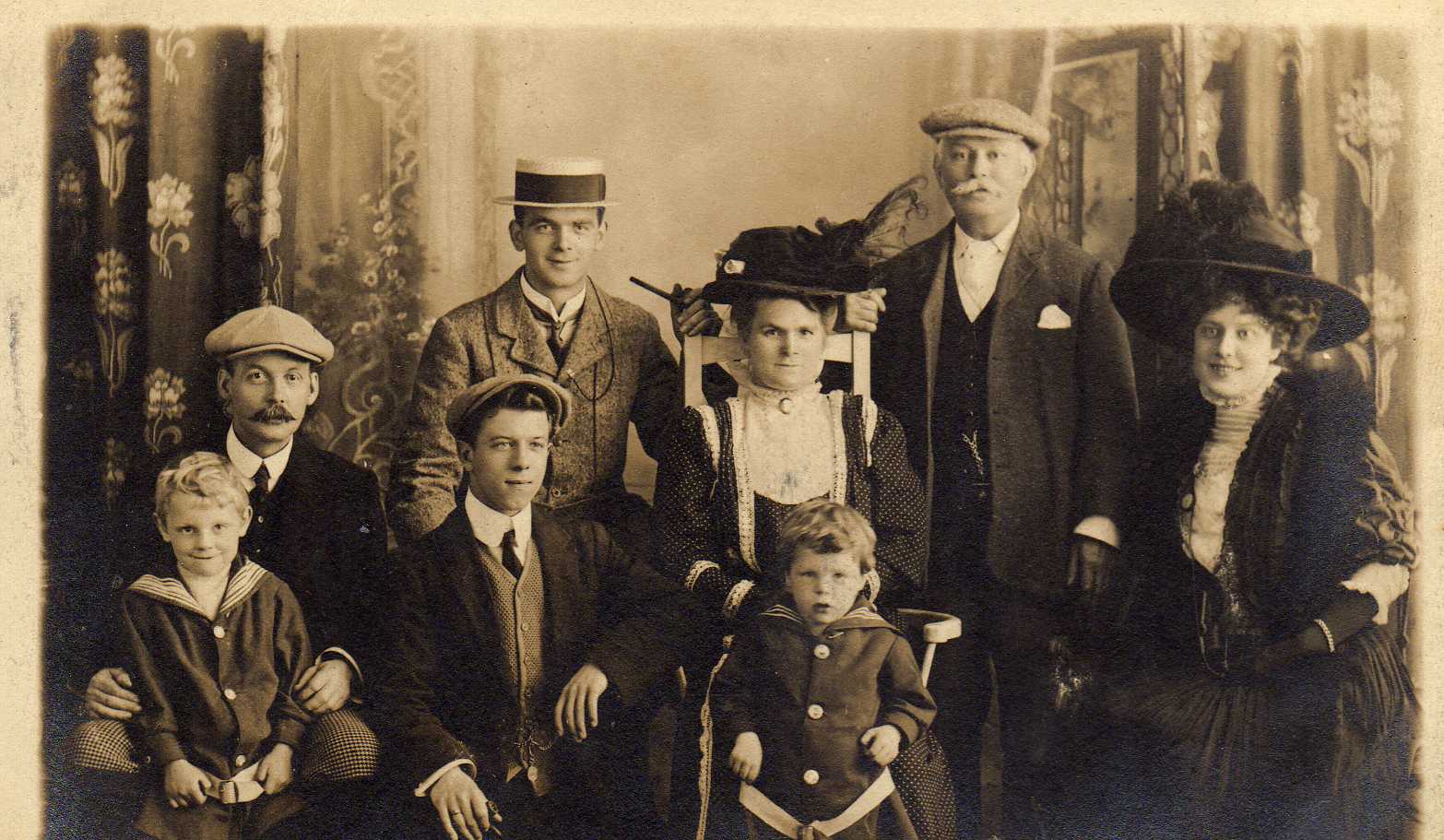
An early photo of Tom Howell (wearing a boater) and family members.
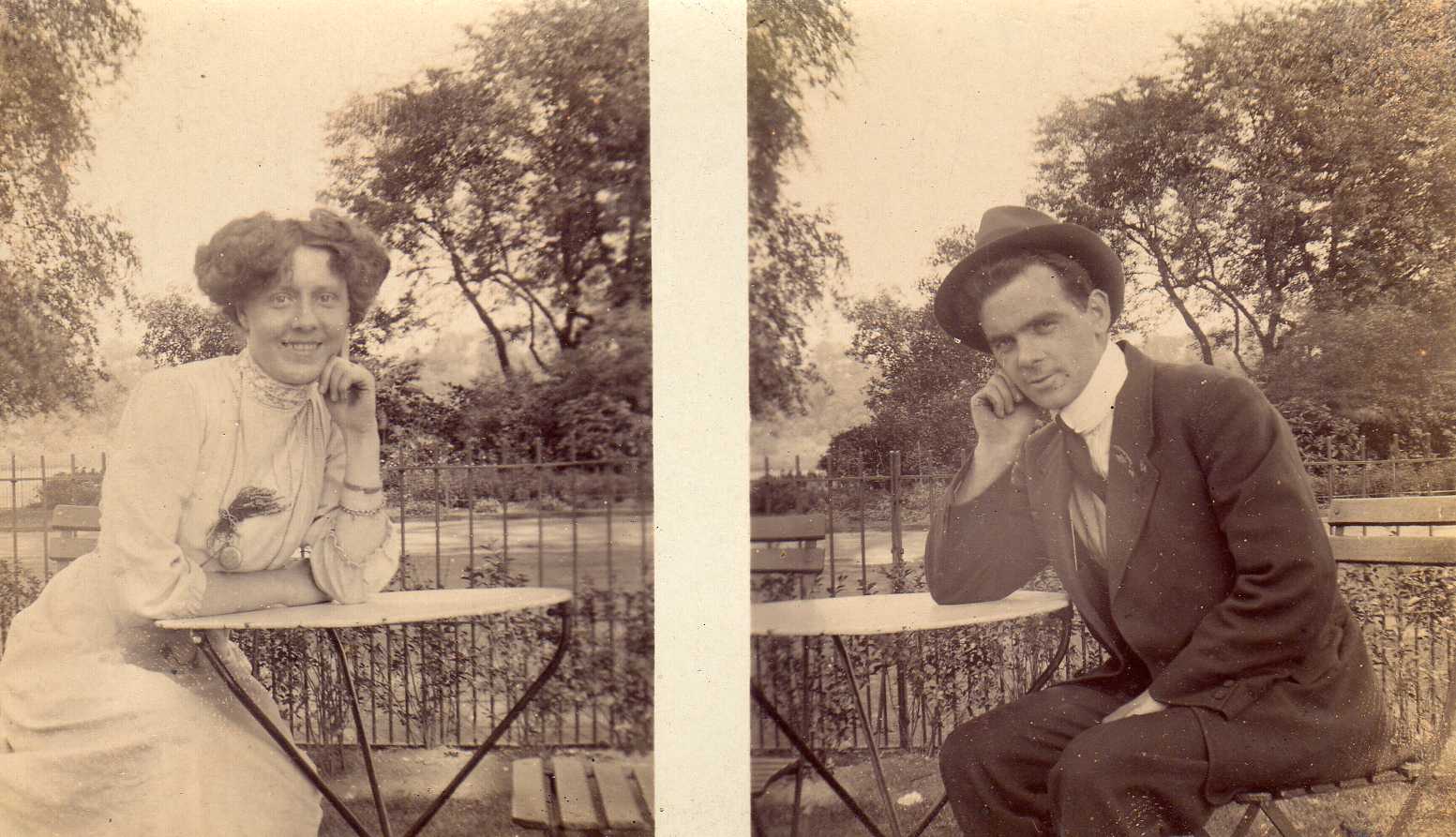
Tom Howell and his wife Hilda September 1911.
In the nineteen-twenties there were Pierrot shows and concert parties at nearly every British seaside resort during the summer season from May to September. These shows had started in the late nineteenth century when a small troupe of male minstrels took up a pitch on the beach front, and the only payment they received after entertaining the gathered crowd was the money collected by a bottler, who went round the crowd to make a collection. These early minstrels were usually “blacked up” men in the style of the famous George Eliot, but by the turn of the century entertainers abandoned the practice of blacking up, were clad in Pierrot costumes and there were women included in some of the troupes of Pierrots.
By the twenties the Pierrots had given way to the seaside concert party, and some of these performers even wore evening dress rather than traditional Pierrot costume. Some entertained the holiday crowds on a pitch on the beach, while others frequented pier pavilions and theatres. Bigger seaside resorts, like Blackpool, offered a variety of entertainment with top performers from the Music Hall circuit and by the thirties this line-up included popular radio and screen personalities.
At smaller resorts entertainment was more modest. A concert party, usually run by a performing manager, would consist of a pianist, a comedian, a dancer, a soubrette and several straight singers. These performers were competent professionals who spent the colder months of the year at company, livery and Masonic dinners, in cabaret at large restaurants to the accompaniment of clattering plates and loud conversation, and, as Christmas approached, in provincial pantomimes. Most of them were unknown to the wider UK public, but became firm local favourites with holiday-makers who spent their week or fortnight’s annual holiday at the same resort, year after year. Straight singers would sing popular ballads and songs of the day and sometimes take part in skits with the comedian and other members of their party.
Professor Kenneth Morgan of Swansea contacted me recently to let me know that he had photographs of the Opieros Concert Party and individual photographs of Anita Edwards, the daughter of his great-grandmother’s sister, who had been a member of the Opieros in the nineteen-twenties. I was delighted to receive copies of these photographs, unfortunately, taken before Webster Booth joined the party in 1927, but Anita is featured in each one. It seems that she joined the Opieros in 1925 and remained with them until 1927.
.
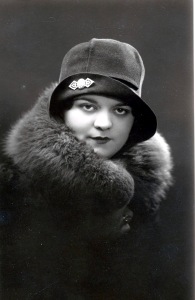 Anita Edwards
Anita EdwardsTom Howell’s Opieros was different from the majority of concert parties for although he employed light entertainers, he combined his strong baritone voice with a good tenor, contralto and soprano to present scenes from the opera, hence the name of his group – Opieros – a hitherto unlikely combination of opera and pier. The group also appeared in municipal parks providing entertainment for those who had not ventured to the coast. Like the leader of the Opieros, Tom Howell from Swansea, and tenor Lucas Bassett from Pontypridd, Anita Edwards was also Welsh, born in Llanelli on 14 November 1900. Anita Edwards was a soprano, who trained at the Royal Academy of Music with Dr Charles Phillips. While she was a student she won many prizes, including the Rutson Memorial Prize and the Westmoreland Prize. While at the Academy she sang the principal roles of Manon in Massenet’s “Manon” opposite Welsh tenor, Manuel Jones and Nedda in Leoncavallo’s Pagliacci.
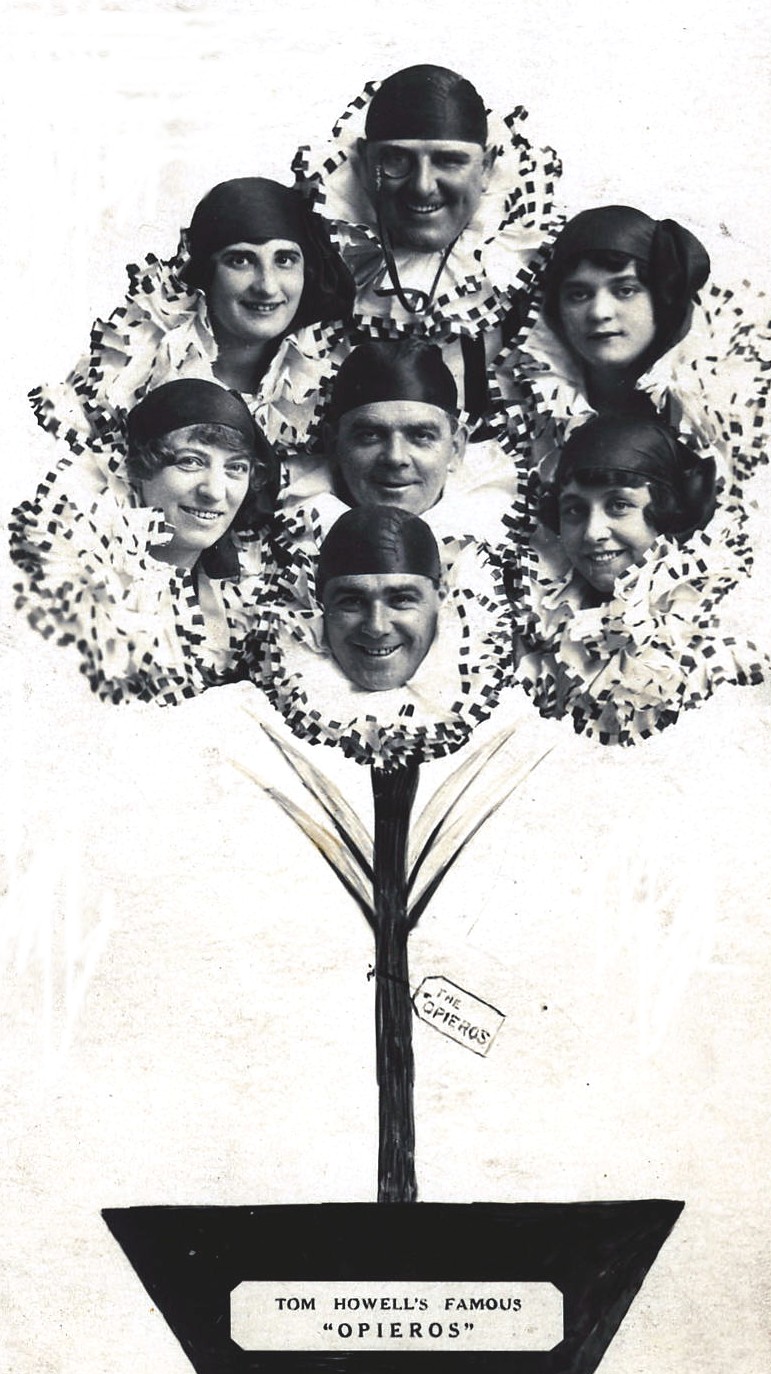 Opieros Tom is in the centre, Anita Edwards(top right).
Opieros Tom is in the centre, Anita Edwards(top right).In 1924 she sang at a concert on Mumbles Pier, which also featured Frank Mullings, one of the foremost tenors of the day, and Idris Daniels of Pencader, a popular baritone. Critics praised Anita particularly for her fine singing of One Fine Day from Madame Butterfly by Puccini. On Christmas night 1925, while on holiday from her tour with the Opieros, she sang in a concert at the Llewellyn Hall, Swansea. This concert comprised selections from various oratorios and featured Frank Mullings and the distinguished Australian baritone, Harold Williams, who was considered to be one of the greatest exponents of Elijah in Mendelssohn’s oratorio, Elijah.
During her time with the Opieros Concert Party, she sang soprano solos and featured in the various operatic ensembles presented by the Opieros. So far we have not found out what Anita Edwards did after she left the Opieros. She married Lionel Beaumont in Wandsworth, Surrey in 1949, and died in Carmarthen in mid-1986.
.
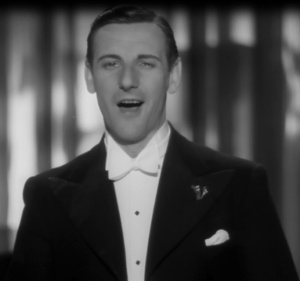 Webster Booth
Webster BoothWebster Booth had worked with Tom Howell’s brother, Henry (stage name, Henry Blain) in the D’Oyly Carte company from 1923 – 1927. When Henry heard that Webster was planning to leave D’Oyly Carte, fearing that he might remain in the chorus forever, waiting vainly to fill “dead men’s shoes”, he suggested that Webster should contact Tom, whose tenor had been taken ill.
Tom employed Webster as a replacement and he remained with the Opieros until 1930, and also appeared in two Brixton pantomimes with Tom in 1927 and 1928. Webster’s first appearance with the Opieros was in the Glasgow park pavilions where his salary in 1927 was £6.10s a week. Judging by notices in The Stage the party was very popular and the performers and their excellent accompanist, H Baynton-Power always received good notices. Peggy Rhodes, a promising contralto, was a member of the party for some time, as well as Walter Badham the humorist and Doris Godfrey, a child mimic.
Tom Howell died in the early nineteen-fifties. If anyone can tell me more about any members of the Opieros, please contact me. Recently I heard from Tom Howell’s great-niece, Sarah Tongue, who was kind enough to send me family photos of the Howell family and give me some information about the family. Their surname was originally Howells, but the “s” was dropped later on. The siblings of Tom Howell were Henry Howell, born in 1895. He was a bass-baritone and sang with the D’Oyly Carte Company under the name of Henry Blain, David, who died in action during World War One, Emlyn who emigrated to Australia, Jack, and their only sister Maud The youngest Howell sibling was her grandfather, William Howell. They had moved from Wales to Bournville in Birmingham where some members of the family worked at the Cadbury factory before World War One.
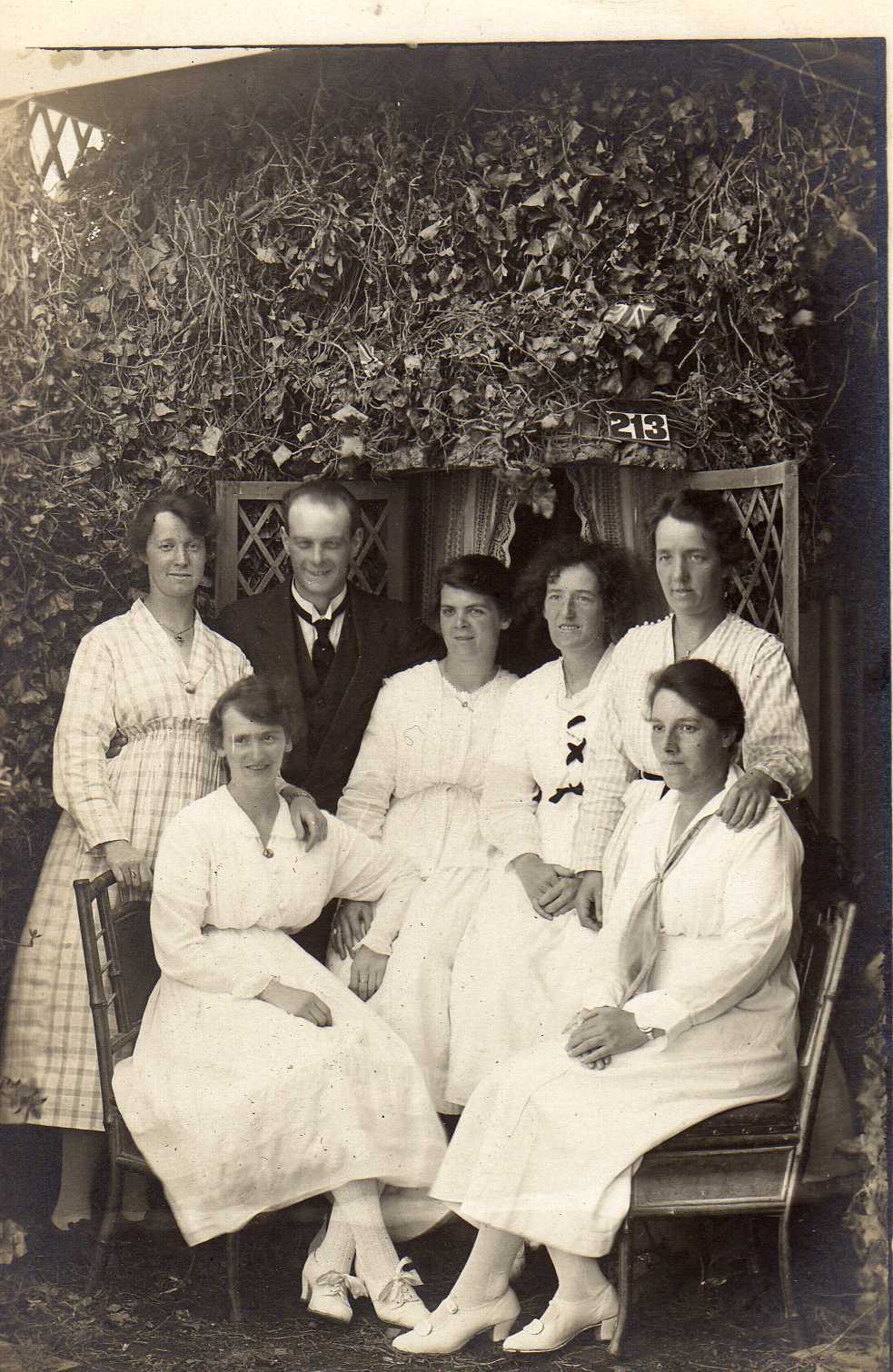
Tom and sister Maud and others while they were working for Cadbury’s, Bournville.
Tom served in the Navy during the First World War. Unlike David, he survived the war and was able to continue his theatrical career when the war ended.
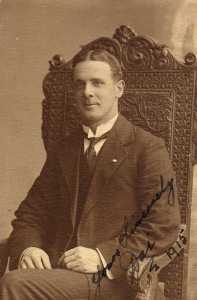
An autographed photo of handsome David Howell who died in action in World War One.
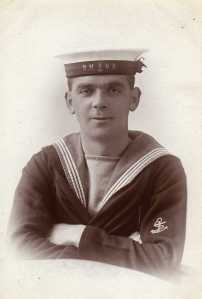
Tom Howell in the navy during World War 1
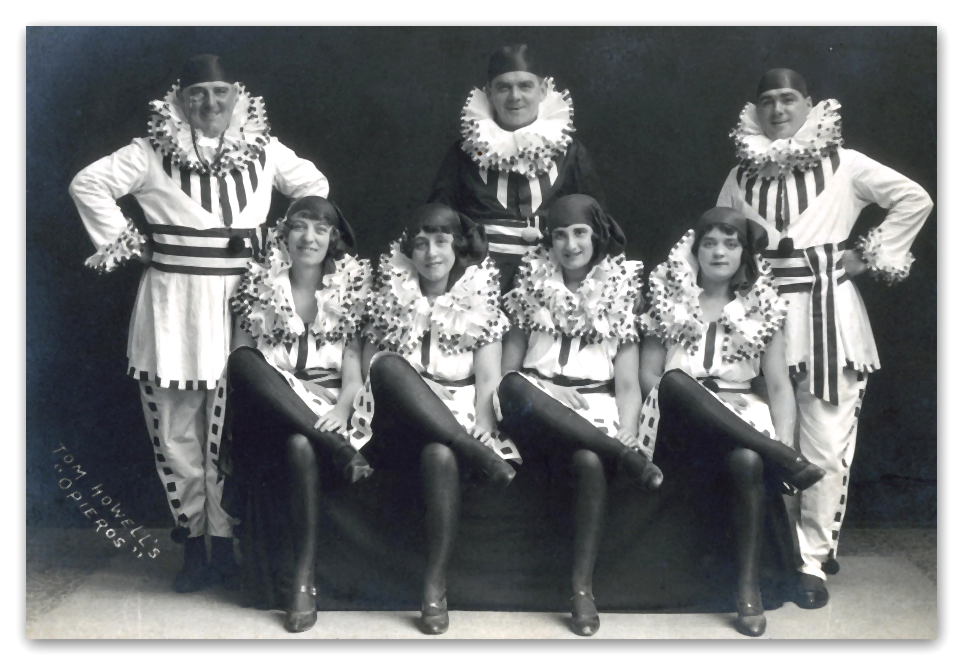 8 May 1924 – The Opieros. A capital entertainment is given this week at the Penarth Pier Pavilion by The Opieros; the vocal talent being remarkably good. A leading item of a fine programme is the Prison Scene from Faust, which is given with considerable ability by Agnes Hirst as Marguerite, Lucas Bassett as Faust and Tom Howell as Mephistopheles… Peggy Rhodes and Hylda Romney add to the evening’s enjoyment. Webster Booth joined D’Oyly Carte Company in 1923, aged 21. He and Henry Blain are listed in this programme for the London season at the Princes Theatre in 1924.
8 May 1924 – The Opieros. A capital entertainment is given this week at the Penarth Pier Pavilion by The Opieros; the vocal talent being remarkably good. A leading item of a fine programme is the Prison Scene from Faust, which is given with considerable ability by Agnes Hirst as Marguerite, Lucas Bassett as Faust and Tom Howell as Mephistopheles… Peggy Rhodes and Hylda Romney add to the evening’s enjoyment. Webster Booth joined D’Oyly Carte Company in 1923, aged 21. He and Henry Blain are listed in this programme for the London season at the Princes Theatre in 1924. 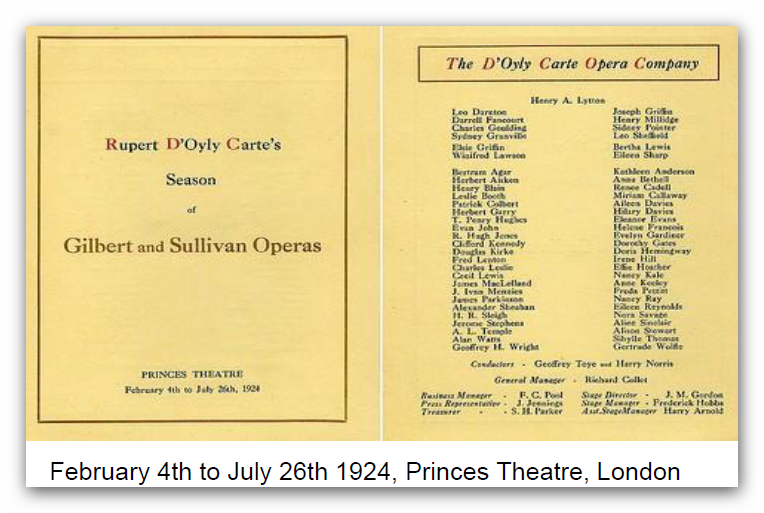 Extract from Duet by Webster Booth and Anne Ziegler (1951) Webster Booth wrote as follows: One of my friends in the D’Oyly Carte Company was a baritone, Henry Blain, a Welshman, whose real name was Henry Howell. When I was looking round for a new opening in the spring of 1927, after returning from Canada, Henry said: “Why don’t you go and see my brother Tom? He wants a
Extract from Duet by Webster Booth and Anne Ziegler (1951) Webster Booth wrote as follows: One of my friends in the D’Oyly Carte Company was a baritone, Henry Blain, a Welshman, whose real name was Henry Howell. When I was looking round for a new opening in the spring of 1927, after returning from Canada, Henry said: “Why don’t you go and see my brother Tom? He wants anew tenor, I think."
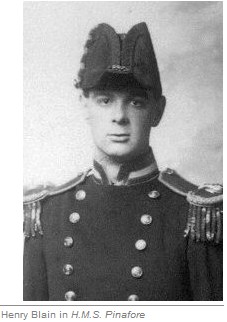
Henry Blain (Howell) Henry Blain was born in 1895 in Wales as Henry Howell.Henry was a bass-baritone chorister with the D'Oyly Carte Opera Company from May 1920 until June 1931. .
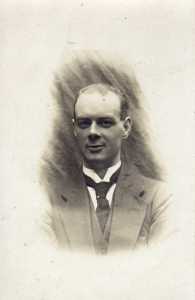
During this time he played the smaller roles of Second Yeoman in The Yeomen of the Guard, Guron in Princess Ida, Samuel in The Pirates of Penzance, and Luiz in The Gondoliers. He was married to Clarice, the D'Oyly Carte wardrobe mistress.
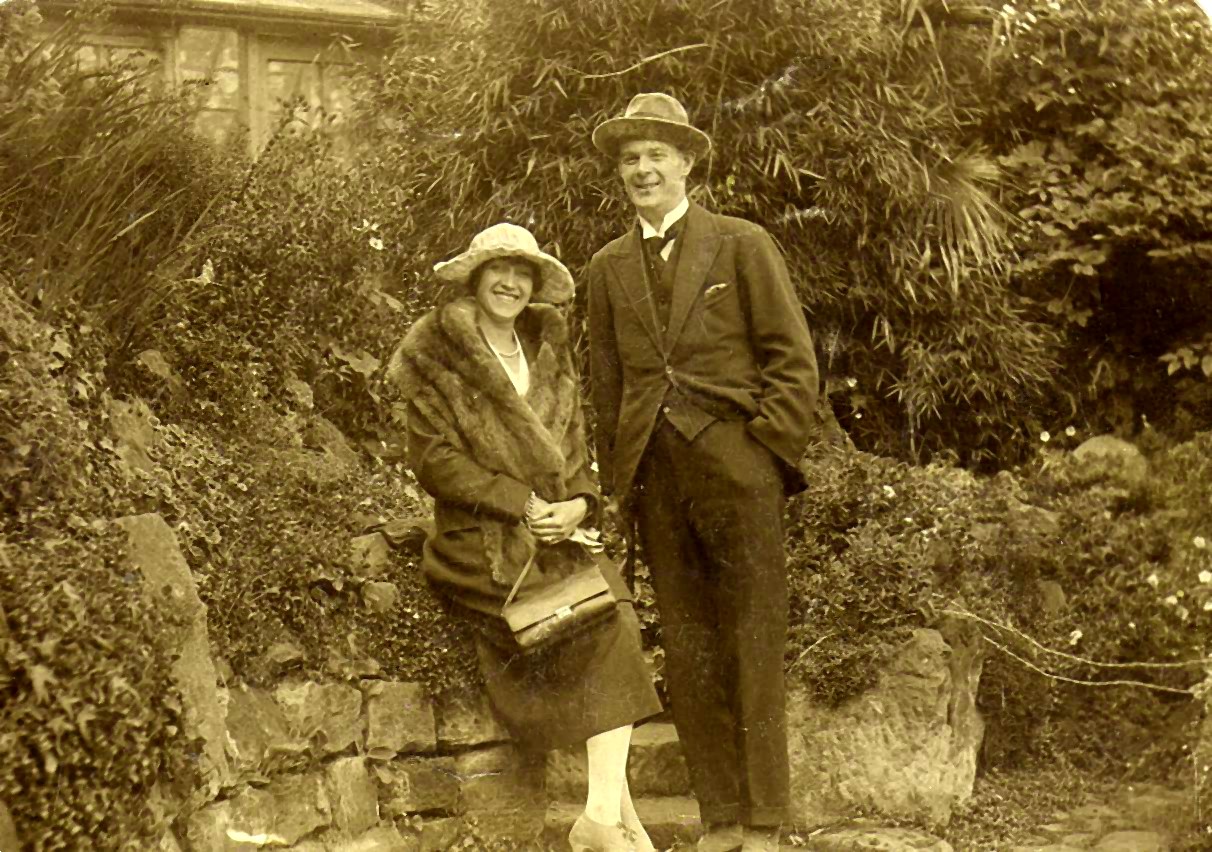 Henry and his wife, Clarice He died in November 1955 at the early age of 60 and was buried in the Family Grave at Yardley Cemetery, Birmingham.
Henry and his wife, Clarice He died in November 1955 at the early age of 60 and was buried in the Family Grave at Yardley Cemetery, Birmingham. 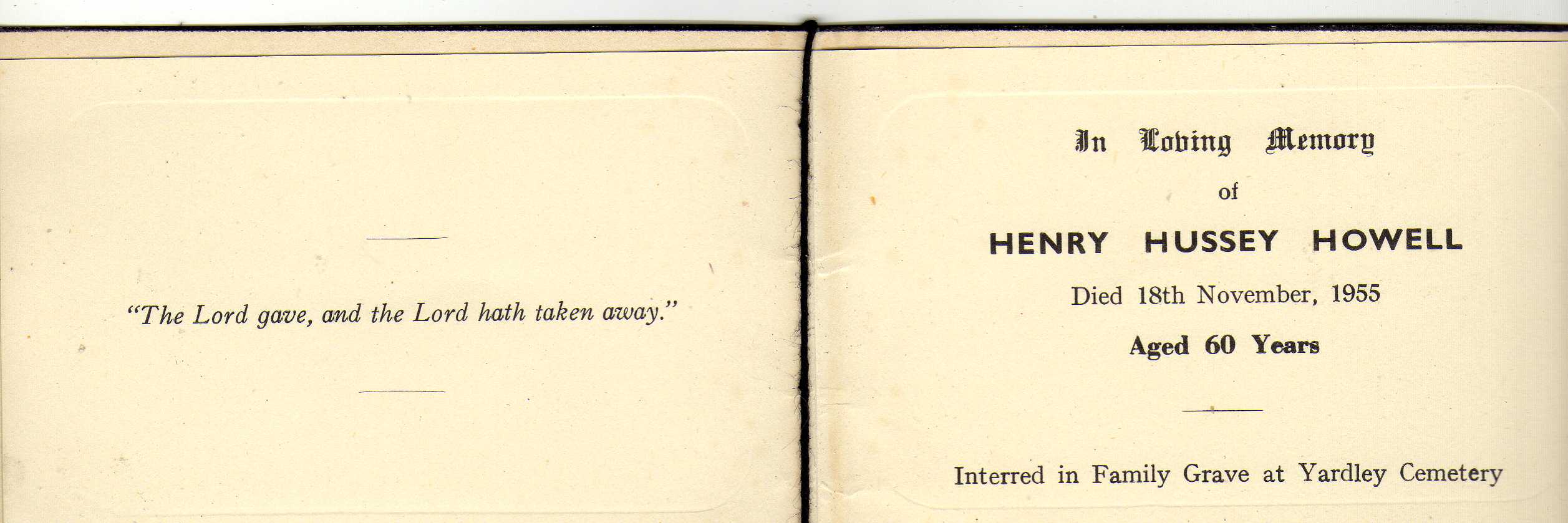 Grand Smoking concert, 21 October 1926, the year before Webster joined the Opieros.
Grand Smoking concert, 21 October 1926, the year before Webster joined the Opieros. 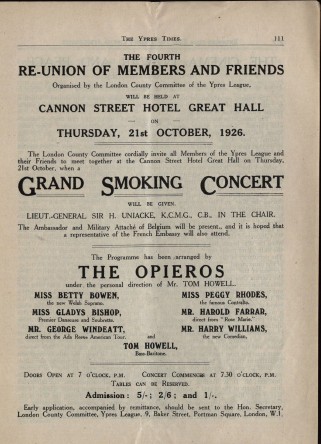
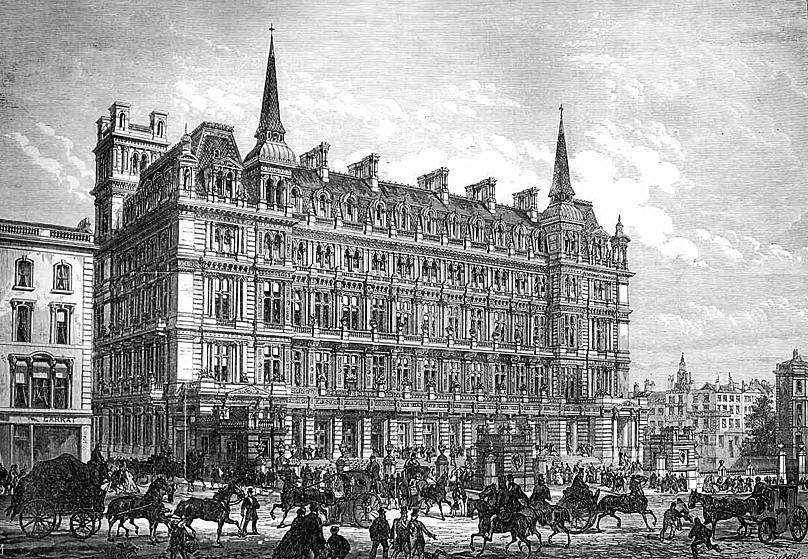 Cannon Street Hotel. The Communist party was founded there in 1920. It was destroyed during the London Blitz of World War Two.
Cannon Street Hotel. The Communist party was founded there in 1920. It was destroyed during the London Blitz of World War Two.Tom Howell was then running a concert party called the Opieros – because they sang excerpts from operas on piers, as well as giving a fine selection of the usual song-and-dance turns. I decided to follow Henry’s advice. Then, during our four weeks’ leave from the D’Oyly Carte Company, Tom Howell’s tenor went down with shingles and, knowing I was ready to move, Tom wired me from Glasgow, where his Company were playing the park pavilions. I took the first train North, got an engagement, and wired D’Oyly Carte asking for my release. This was granted, and I signed on with Tom at the substantially increased salary of £6.10s a week.
It was grand experience, and taught me a very great deal. Singing extracts from operas, and travelling each Sunday to seaside places, I learned how to hang stage curtains, make stages, work out intricate journeys by train, boat and lorry in some cases, how to pack unwielding stage props and curtains, and above all how to check the money in a “house” without counting the tickets! It matters, believe me! I very soon knew by glancing through the curtain peephole whether a “house” was below £20 or above £50. I was swept into the extraordinary camaraderie of the concert party, which is one of the nicest states on earth – but only if the troupe is well managed!
I learned how to avoid causing professional jealousies, how to make the most of my turn without giving offence, how to hold a restive audience of casual holidaymakers worrying about the next boarding-house meal or whether little Tommy (left in charge of someone else) has yet met with a fatal accident. That was a happy summer, a summer of sunshine and laughter, boy-and-girl light heartedness, a lot of swimming and strolling and fun.
When it was over we came to London. I had most of my last week’s salary in my pockets, and nothing else in them except my hands! I had never heard then, of such things as Masonic banquets and Sunday League Concerts, and I was suddenly awfully worried about what to do next. Tom knew this, and took me to his home.
Each evening he had such a booking he would take me along with him. Often, when he had sung his first group of songs, he would introduce “a new young singer who will sing a duet with me”.After a time, this resulted in my obtaining some winter bookings of my own, and so I was able to pay back what I owed and make my financial way. I don’t know what I should have done without Tom Howell’s kindness and generosity at that time.
1927-1930 – Tom Howell’s Opieros concert party. The concert party presented operatic excerpts at park pavilions and piers. Webster's first appearance with them was in Glasgow in the summer of
1927. By this time Webster Booth was living in Tom Howell’s former apartment, at 103A Streatham Hills, SW2, Streatham 7989. Tom Howell’s new address was: 1 Daysbrook Road, SW2. Telephone: Streatham 1380
.
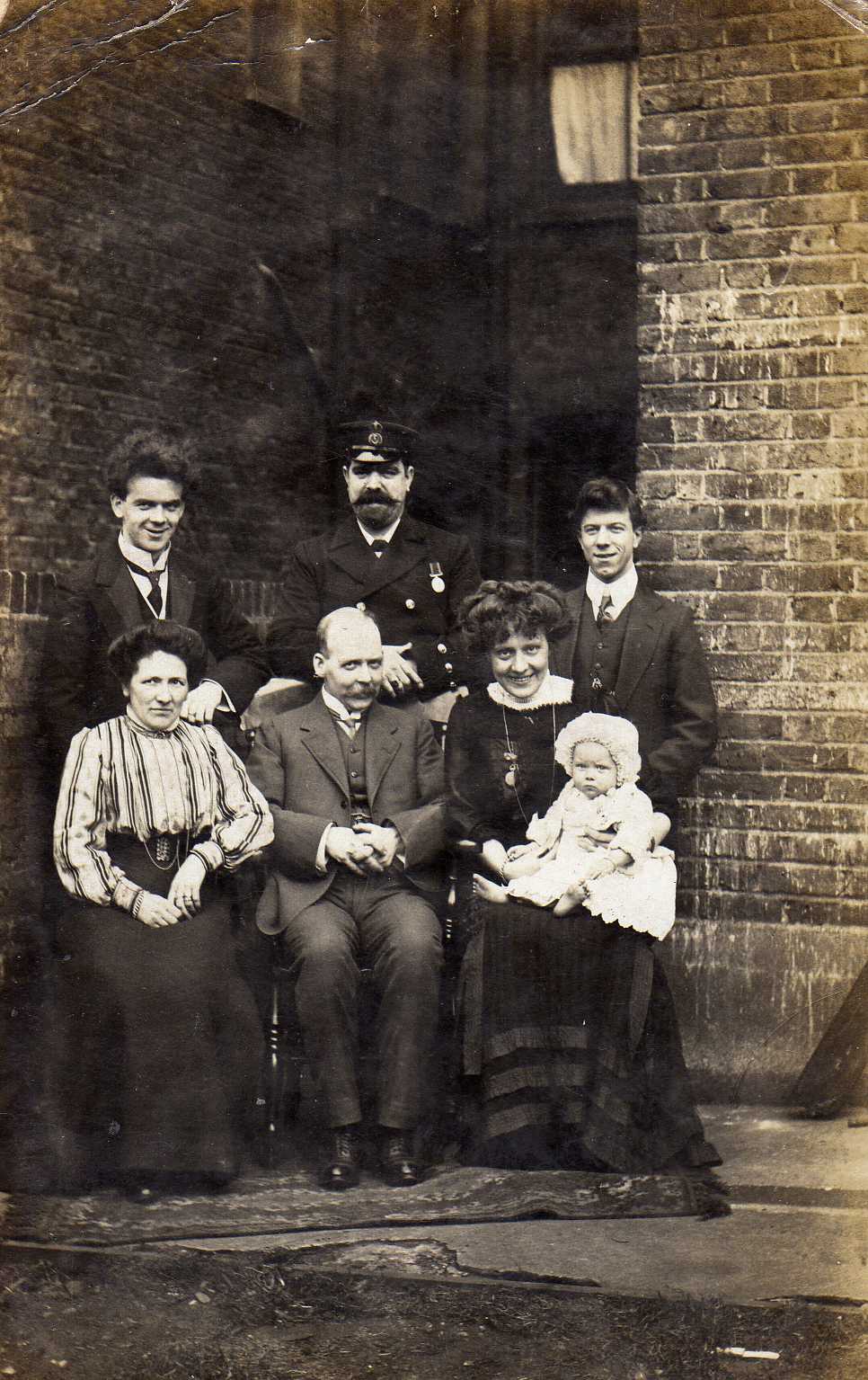
Tom (left) in back row, his wife Hilda with baby daughter Miffanwy and other family members
That winter he introduced me to Fred Melville, the famous “pantomime king” of the period, and somehow persuaded him to book the two of us in his pantomime at the Brixton Theatre, St George and the Dragon. I was to be King Arthur and Tom was Sir Mordred de Killingsbury, the villain of the piece. It was my first venture into the strange world of pantomime, and I loved it! The whole secret is that the players make a sort of party of it, in which the children (and their parents!) are guests who join in all the songs and play a great part in everything themselves. The show was a great success. I remember a banquet scene when, after a few very fiery words between us, Tom and I stepped out and sang (for no reason at all) the famous old duet Love and War. This always gained enormous applause, and is still remembered by a lot of Brixtonians.
30 December 1927 – The Stage. Saint George and the Dragon, The Brixton. On Monday, December 26 1927, Mr Frederick Melville presented here his twentieth annual pantomime, written and produced by him, the music composed and arranged by F. Gilmour Smith.
St George of England: Miss Vera Wright,
St Patrick of Ireland: Miss Eileen O’Brian,
St Andréw of Scotland: Miss Maggie Wallace,
St David of Wales: Mr Lloyd Morgan,
St Denis of France: Miss Marie Fontaine,
St Anthony of Italy: Miss Lily Wood,
St Michael of Russia: Miss Agnes Moon,
King Arthur of England: Mr Webster Booth,
Sir Mordred de Killingsbury: Mr Tom Howell,
Stephen Stuffingley: Mr C Harcourt Brooke,
Tricky Dicky: Mr Willie Atom,
Princess Guinevere: Miss Doris Ashton,
Fairy Starlight: Miss Hilda Goodman,
Mary Fairly: Miss Marjorie Holmes,
Demon Ignorance: Mr Fred Moule,
Dame Agatha Lumpkin: Mr Leslie Paget,
Jerry Lumpkin: Mr Larry Kemble.
There is a fine patriotic flavour, to say nothing of sundry allusions to the need for keeping old England healthy, both bodily and mentally, by sweeping out the germs of disease and distrust, all worked in the usual deft Melvillean fashion in this year’s Brixton pantomime.
Choosing the unusual subject of St George and the Dragon, Mr Melville has written a story at once original and arresting. Mr Webster Booth adds stateliness and a pleasing tenor voice, heard in England, Mighty England and Tired Hands, and with Sir Mordred, Tenor and Baritone, to the part of the King. Mr Tom Howell’s Sir Mordred is a sound piece of character work, though he finds small scope in the part for his powerful baritone. Pantomime and Tom Howell’s kindness saw me through that winter, and then came another summer of concerts on the piers.
We had a clever humourist in Walter Badham and a fine child mimic in Doris Godfrey. One of the best singers we had, for whom we all expected a great career, was Peggy Rhodes. St Anne’s, Sheerness, Lowestoft, Yarmouth, Paignton, Broadstairs, Whitley Bay – I can shut my eyes today and see the sun on the rippling water, smell the dust in a dozen pier pavilions, hear the shuffle and chatter of the audience die away as the curtain swings up for our opening chorus, and recapture all the excitement, triumph and heartbreak, and taste for just a moment once again the lost elixir of youth.
19 January 1928 – Gallery First Nighters’ Club. Dinner to Mr Miles Malleson. The seating and eating capacity of the Comedy Restaurant was strained to its uttermost on Sunday evening, when that happy band of playgoers, the Gallery First-Nighters’ Club, had Mr Miles Malleson as their guest of honour at dinner... Mr Major, responding, paid a tribute to the artistes for the wonderful concert they had given them. It was indeed a wonderful concert. The artistes included Miss Betty Chester, Miss Dora Maughan, Mr George Metaxa, Miss Dorrie Dene, Mr Ashmoor Burch, Misses Grace Ivell and Vivian Worth, Messrs Webster Booth and Tom Howell, Miss Winifred Howie, and Mr Algernon Moore, and Miss Elsa May, Miss Nora Drake was at the piano.
24 May 1928 – Cardiff – At Roath Park Pavilion Tom Howell presents his Opieros. The programme ranges from opera to modern burlesque. Webster Booth’s tenor numbers are very well rendered, and Doris Francis (soprano), Olive Turner, Dorothy Denny, Harry Williams, Tom Howell, and H Baynton-Power give enjoyable performances.
7 June 1928 – Tom Howell’s Opieros meet with their usual welcome at the Olympian Gardens, Rock Ferry, where their popularity increases with every visit. Doris Francis is a delightful singer of soprano songs, and Webster Booth’s tenor solos meet with appreciation. Harry Williams is a mirth-maker who never fails to keep his audience in merry mood. Olive Turner and Dorothy Denny are favourites, and their participation in the concerted sketches adds to the enjoyment. Tom Howell directs the programme with his usual skill.
30 August 1928 – The Opieros Tom Howell’s Opieros are at the Adelphi Gardens, Paignton. Good singing plays an unusually prominent part in the entertainment, and it is provided mainly by Tom Howell, a robust baritone, Doris Francis a soprano with a pure voice, and Webster Booth, a rich tenor. They score in excerpts from grand opera. Olive Turner gives some clever imitations and smart soubrette songs. Dorothy Denny wins much favour with her low comedy songs. Admirable phonofiddle playing and humorous contributions make Harry Williams popular. The Opieros owe a deal of their success to the talent of their pianist, H. Baynton-Power.
 Tom, Hilda and family (older). 27 September 1928 – At the Summer Pavilion, Sheerness, Tom Howell is presenting his Opieros. This talented company attract large audiences and the show is well produced. The programmes include an excellent mixture of straight and comedy numbers, ranging from burlesque to grand opera. The high class vocal contributions by Tom Howell, Doris Francis and Webster Booth, all of whom are cultured singers, make a decided appeal to a delighted house. By way of contrast, Olive Turner entertains in several clever impersonations and sings a catchy song. Dorothy Denny is a comedienne of no mean ability, and has a style of her own. Harry Williams is the chief fun-maker of the party, and besides keeping everyone in a good humour with his patter and gags, he pleases the house as an instrumentalist, and coaxes melody from unlikely objects. H. Baynton-Power is a composer-pianist and artistically accompanies the performers and musically brightens the entertainment. .
Tom, Hilda and family (older). 27 September 1928 – At the Summer Pavilion, Sheerness, Tom Howell is presenting his Opieros. This talented company attract large audiences and the show is well produced. The programmes include an excellent mixture of straight and comedy numbers, ranging from burlesque to grand opera. The high class vocal contributions by Tom Howell, Doris Francis and Webster Booth, all of whom are cultured singers, make a decided appeal to a delighted house. By way of contrast, Olive Turner entertains in several clever impersonations and sings a catchy song. Dorothy Denny is a comedienne of no mean ability, and has a style of her own. Harry Williams is the chief fun-maker of the party, and besides keeping everyone in a good humour with his patter and gags, he pleases the house as an instrumentalist, and coaxes melody from unlikely objects. H. Baynton-Power is a composer-pianist and artistically accompanies the performers and musically brightens the entertainment. .20 December 1928 – Pantomime forecasts The Brixton. The Babes in the Wood, written by Frederick Melville. Principal boy, Vera Wright; principal girl, Teresa Watson; principal comedians, Tom Gumble and Jimmy Young; Fairy Queen, Gwen Stella, baritone Tom Howell; tenor Webster Booth. Specialities by Euphan Maclaren’s Operatic Dancers, Babette, Grar and Grar. Principal scenes: The Village, The Schoolroom, Ballet, Children’s Bedroom, Sherwood Forest, and Palace. Stage manager, Fred Moule. Produced by Frederick Melville on December 26, at 2pm, for run of about 7 weeks. Webster continues: The following Christmas we were booked again for Brixton, this time in Babes in the Wood. I was Will Scarlett and Tom was Little John. My big moment was in the wood scene when I entered in a blackout with a red glowing fire, and sang with heartrending passion Chloe. This always stopped the show, and an encore was demanded.
Broadcast - The Opieros 2ZY Manchester, 6 April 1929 19.50 Synopsis TOM HOWELL'S CONCERT PARTY Relayed from the Central Pier, Blackpool WALTER BADHAM (The popular Comedian) BAYNTON-POWER (Pianist and accompanist)
Doris GODFREY (Comedienne)OLIVE TURNER (Entertainer) WEBSTER BOOTH (Tenor) Doris FRANCIS (Soprano) Tom HOWELL (Bass-Baritone)
27 June 1929 – The Opieros At the Pergola Pavilion, Bexhill, are Tom Howell’s Opieros. Their entertainment is of high quality, and the programmes contain a series of operatic scenes, all well sung. Tom Howell is a melodious baritone, Webster Booth is a tenor of rare ability, and Doris Francis is a delightful soprano, and the work of these vocalists sets the high standard of the company’s serious work. Walter Badham is well known to Bexhill audiences, having formerly played a resident season there, and his Lancashire humour is more welcome than ever. Dorothy Denny is a piquant comedienne, and Doris Godfrey presents some kid numbers well. Jack Upson is at the piano. Will Tissington and Katharine Craig are the directors of the Pergola, and next week they will present their own Poppies for their seventeenth season.
5 September 1929 – The Opieros Tom Howell and his Opieros are fulfilling an engagement at the Adelphi Gardens, Paignton, this week. The company includes several artistes who have appeared with Mr Howell in previous years, and established themselves warm favourites. These are Doris Francis, a fine soprano; Webster Booth, who has a strong tenor of good quality; and Dorothy Denny, an excellent comedienne. Doris Godfrey gives clever child impressions and Walter Badham is a talented humorist. The piano is in charge of Jack Upson, who excels in syncopated music. Features of the programme include excerpts from grand opera, and duets by Webster Booth and Tom Howell, baritone.
19 September 1929 – The Opieros Tom Howell’s concert party, the Opieros, are playing to good houses this week at the Sheerness Pavilion. Webster Booth and Tom Howell combine pleasingly in tenor and baritone duets, and also score individually in vocal items. Doris Francis’ soprano solos are rendered with good effect and Doris Godfrey is a clever impersonator. In Dorothy Denny the party has a bright and popular comedienne. Jack Upson is the skilful accompanist. Walter Badham causes much amusement with his quaint and mirth-provoking numbers. The party also score in excerpts from opera, which make a strong appeal to the audiences.
I spent three summers with the Opieros, and enjoyed them enormously. I learned a good deal about stagecraft, touring and management. I was getting known to some extent in London and the provinces, and by this time I was making a fair amount of money from gramophone records.I had always had a great ambition to make them – somehow, in my early days, they seemed to me to be the mark of Fame with a capital letter.
Tom Howell introduced me to a director of Edison Bell Records, who arranged for me to make a test at their City Road studios. I was to ask for Mr Harry Hudson. Off I went, walking on air, met Mr Hudson and sang The English Rose from Merrie England. Out came Mr Hudson from the inside room. I wonder if he remembers what he told me!“I’m afraid your voice won’t record!” he said. Now I had been inside a recording studio before, and I knew that through a small glass window was a room where the engineers put small round waxes on a turntable, and when a needle was lowered on to the wax it reproduced what went on in the studio. I felt sure no wax had been put on. I was young in the profession then. I do not know what anyone had against me, or had been told. I only knew that my voice had apparently not been tested.I walked out of the studio into the sordid squalor and noise of City Road, wondering furiously and miserable what it was all about. I had gone in such a short time before with such high and eager hope.
Shortly afterwards, Lawrence Wright (Horatio Nichols) wrote a song called My Inspiration is You. He told Tom that if I would sing it at the coming Sunday League Concert, he would come along and perhaps arrange a test session for me with the Columbia Graphophone Company. Chastened and uneasy this time, I awaited his arrival, and saw him drive up in an enormous white Rolls-Royce to the Empire Theatre, Croydon, where the concert was taking place. He stepped out, noticed me, and patted the car. He was wearing a magnificent fur coat.“All out of one song, me boy!” he said cheerfully.It was true – it had come from his Toy Town Parade. It sold over a million copies!
After three summers I left the Opieros and signed a contract to join Muriel George and Ernest Butcher in their concert party at the Central Pier, Blackpool. It was a change that cost me a pang, for Tom Howell had been very kind to me, and I had made some good friends in his Company. Tom is a Welshman from near Llanelli. He spent his early days in Cadbury’s at Bournville. He excelled in oratorio and Grand Opera, and had he stayed in Grand Opera he must have become a star. But, like me, he had to live by his voice, and Grand Opera needs some sort of independent income at first.
Tom became a Blackpool concert-party idol, and sang concerts in London and the provinces in the winter. He founded his Opieros Company in 1924, and it presented famous scenes from Faust, Bohème, Butterfly and the rest. Tom was a tough personality, and his voice was like steel. He was too generous to spot his enemies, who flocked round him when he had money or drink to dispense. He kept me in his home when I was more or less on my uppers, and he never begrudged a young singer advancement – indeed, he helped with absolute unselfishness in every way he could. I owe him a lot.I signed up with a fresh concert party because I was offered more money and a better place on the bill. Tom wished me the best of luck when I said good-bye. Webster Booth
In 1936 Tom spent a considerable time in hospital.
6 November 1936 – Tom Howell. Friends of Tom Howell, who was well known in concert and concert party circles, and has recently been appearing in musical plays in the West End, will be sorry to hear of his illness. He is a patient in Guy’s Hospital.
He was still in hospital at Christmas in 1937 when Hilda sent this charming Christmas card with a photograph of her and Tom with their lovely wire-haired fox terrier.
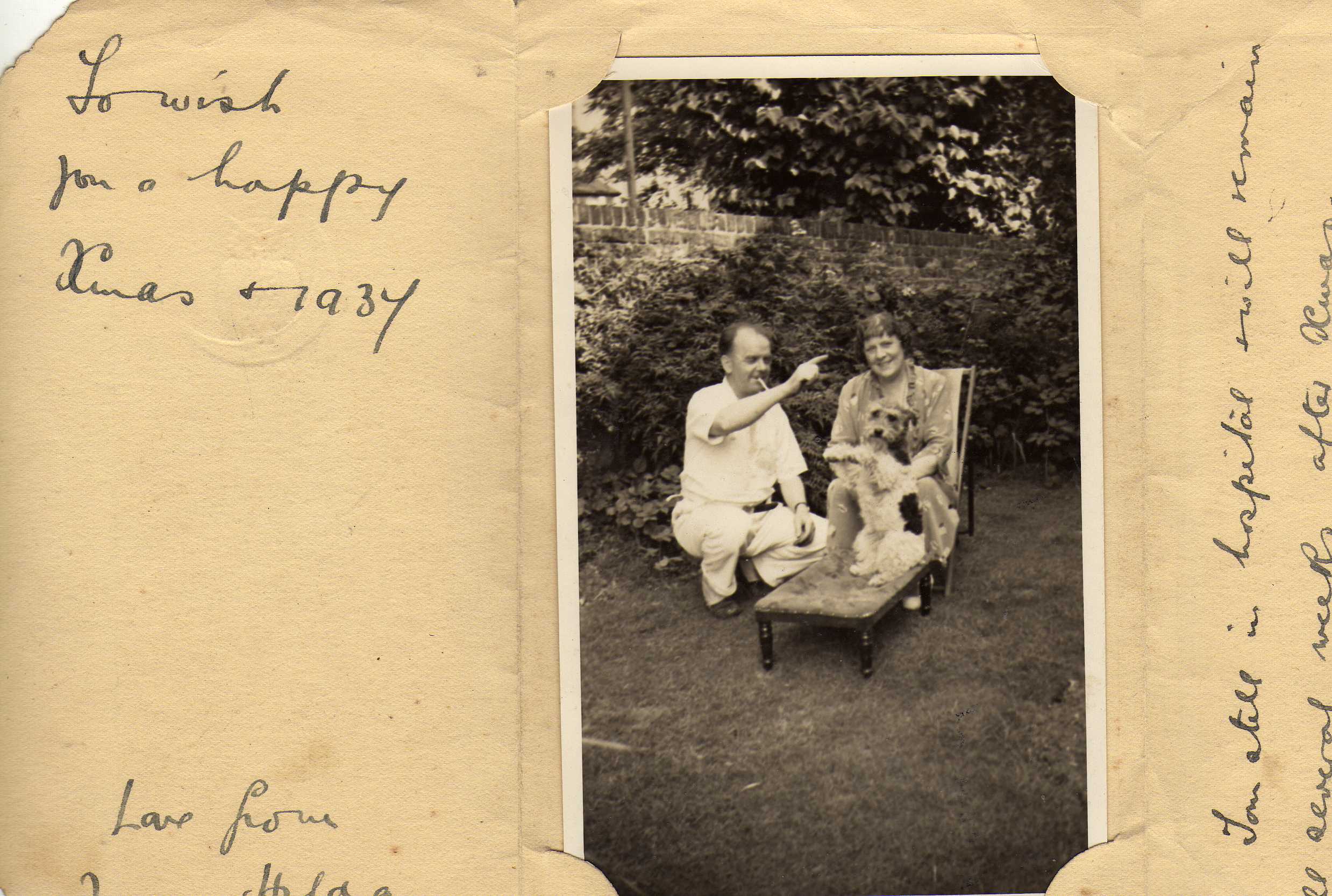
24 April 1952 – Tribute to Tom Howell. Our Great Yarmouth correspondent writes: The late Tom Howell was well remembered in Great Yarmouth, for it was at the Wellington Pavilion that he first presented his Opieros. They made their debut in June, 1922, playing a resident season, followed by a return in 1923. In the first company were Harold Wilde, Yarmouth-born Evelyn Ray, Lilian Rickard, Eric Howard, Violet Field, Donald Hatton, Charles Hayes and Tom Howell himself. The 1923 company had but two changes in its personnel, Peggy Rhodes and Kathleen Burchell replacing Miss Rickard and Miss Field…In subsequent seasons the Opieros were regular visitors to the Britannia Pavilion, which in those days was a popular venue for the leading touring concert parties.
Compiled by Jean Collen 20 February 2017
With thanks to Professor Kenneth Morgan and Sarah Tongue for sharing their photographs with me. Extract from Duet by Webster Booth and Anne Ziegler published in 1951, Stanley Paul. My digitised copy of the book is available as a paperback and E-book at: Duet by Webster Booth and Anne Ziegler
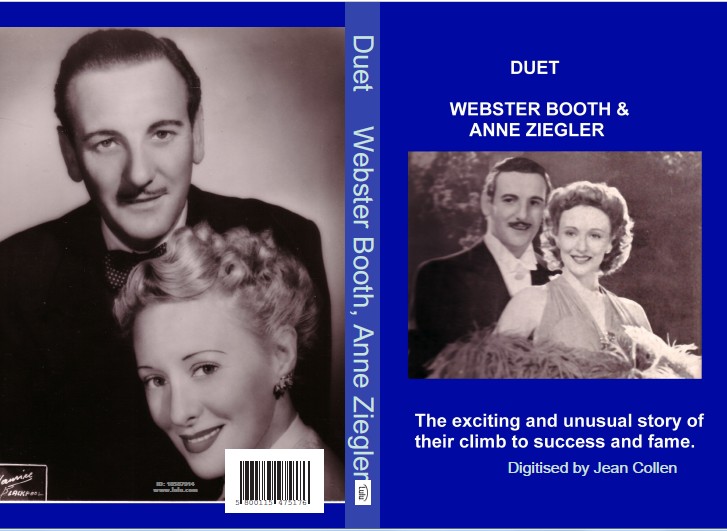

Hi. You mention "Judging by notices in The Stage the party was very popular and the performers and their excellent accompanist, H Baynton-Power always received good notices." I'm interested in finding out more about Baynton-Power, but information seems to be thin on the ground. Just thought I'm mention it in case you have any suggestions! Cathy
ReplyDeleteThank you for your comment, Cathy. I'm afraid I don't know much more about H. Baynton-Power apart from his association with the Opieros in the 1920s. He composed quite a lot of music and there is a Pathé video of the Bournemouth orchestra playing one of his compositions at: https://youtu.be/9jHL3CC_2io
DeleteRegards, Jean.